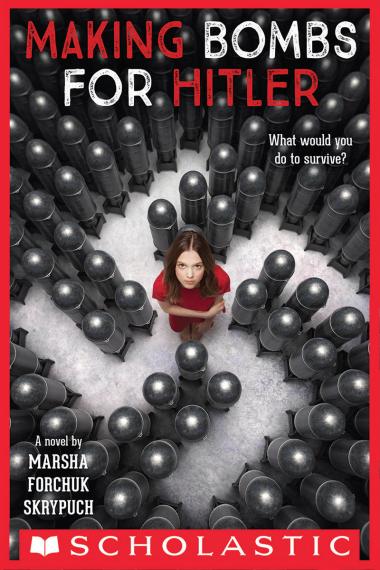
Making Bombs for Hitler
About this book
Lida thought she was safe.
Her neighbours wearing the yellow star were all taken away, but Lida and her family are not Jewish. They will be fine, won’t they?
But Lida cannot escape the horrors of World War II.
She loses her parents, and is ripped away from her beloved sister, Larissa. The Nazis take Lida to a brutal work camp, where she and other Ukrainian children are forced into backbreaking labor. Starving and terrified, Lida bonds with her fellow prisoners, but none of them know if they’ll live to see tomorrow.
When Lida and her friends are assigned to make bombs for the German army, Lida can’t stand the thought of helping the enemy. Then she has an idea. What if she sabotaged the bombs. . . and the Nazis? Can she do so without getting caught? And if she’s freed, will she ever find her sister again?
This pulse-pounding novel of survival, courage, and hope shows us a lesser-known piece of history—and is sure to keep readers captivated until the last page.
Reviews
Praise for Making Bombs for Hitler:"A gripping story that asks: What would you do to survive?" -- Alan Gratz, author of Prisoner B-3087
"Inspired by real, historical accounts, this is a powerful, harrowing story of transformation." -- Booklist
"Skrypuch draws on real-life stories of survivors in telling Lida's poignant tale, and she creates a cast of young people who are devoted to one another in both thought and deed.... A well-told story of persistence, lost innocence, survival, and hope." -- Kirkus Reviews
"The story [has a] strong undercurrent of friendship and loyalty; an author's note gives further background on this important piece of history." -- Publishers Weekly
"Students will admire Lida's pluck amid such heinous conditions.... An absorbing read about the lesser-known Ukrainian experience during World War II, this is a solid choice for curricular ties and for middle school historical fiction collections." -- School Library Journal
"Skrypuch has written a gripping, emotional novel of one Ukrainian girl's perseverance during the horrors of war.... This is a vivid picture of what youth experienced during World War II and the hopelessness of displaced populations of all backgrounds and religions." -- VOYA









